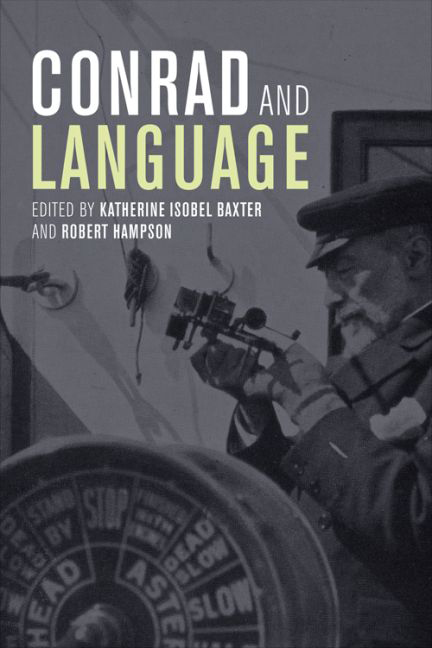Book contents
- Frontmatter
- Contents
- A Note on Texts
- Introduction
- 1 Conrad and Nautical Language: Flying Moors and Crimson Barometers
- 2 Navigating the ‘Terroristic Wilderness’: Conrad's Language of Terror
- 3 Conrad, G. E. Moore and Idealism
- 4 Conrad's Language of Passivity: Unmoving towards Late Modernism
- 5 The Powers of Speech in Conrad's Fiction
- 6 ‘Soundless as Shadows’: Language and Disability in the Political Novels
- 7 Conrad and Romanised Print Form: From Tuan Almayer to ‘Prince Roman’
- 8 Languages in Conrad's Malay Fiction
- 9 Gallicisms: The Secret Agent in Conrad's Prose
- 10 ‘The speech of my secret choice’: Language and Authorial Identity in A Personal Record
- 11 The Russian Redemption of The Secret Agent and Under Western Eyes
- Afterword
- Contributors
- Index
1 - Conrad and Nautical Language: Flying Moors and Crimson Barometers
Published online by Cambridge University Press: 12 September 2017
- Frontmatter
- Contents
- A Note on Texts
- Introduction
- 1 Conrad and Nautical Language: Flying Moors and Crimson Barometers
- 2 Navigating the ‘Terroristic Wilderness’: Conrad's Language of Terror
- 3 Conrad, G. E. Moore and Idealism
- 4 Conrad's Language of Passivity: Unmoving towards Late Modernism
- 5 The Powers of Speech in Conrad's Fiction
- 6 ‘Soundless as Shadows’: Language and Disability in the Political Novels
- 7 Conrad and Romanised Print Form: From Tuan Almayer to ‘Prince Roman’
- 8 Languages in Conrad's Malay Fiction
- 9 Gallicisms: The Secret Agent in Conrad's Prose
- 10 ‘The speech of my secret choice’: Language and Authorial Identity in A Personal Record
- 11 The Russian Redemption of The Secret Agent and Under Western Eyes
- Afterword
- Contributors
- Index
Summary
At the very start of his writing career, when Conrad first submitted the typescript of Almayer's Folly to Fisher Unwin for consideration for their Pseudonym Library, it bore the name ‘Kamudi’, the Malay word for ‘rudder’. This foreshadowed his subsequent pseudonymous entry into professional writing; it provided a linguistic context for the novel's opening words (‘Kaspar! Makan!’) and for the smattering of Malay words in the opening chapters (‘godowns’, ‘rattan’, ‘prau’). To begin with, many of the Malay words used in the novel are transparent: they have acquired the status of loan words, part of the verbal traffic of British colonial trade. Subsequent Malay words – Rajah Laut, Tuan, Orang Blanda, Mem Putih – will become familiar in the course of Conrad's Malay fiction; others (chelakka, bitcharra, Tannah Mirrah) are more recherche. Nevertheless, as one reviewer noted, the ‘few Malay words sprinkled about his pages set up none of the feeble irritation that most foreign tongues, used as local colour, are apt to do: they have the piquancy of capsicums in a curry’. What is missing from this novel (and from Conrad's Malay fiction generally), however, is the Malay language for working a ship, some of which Conrad presumably knew, since he was familiar with the word ‘kamudi’. Instead, we find in Conrad's Malay fiction the usual British nautical language: brig, roadstead, supercargo, bulwarks, fore-deck, poop.
Nautical language had entered English prose writing with the early accounts of voyages of exploration. Swift had satirised this language – and the obscurity of precise technical terms to the general reader – in Gulliver's Travels. At the start of Book II, there is a long paragraph in which Gulliver describes how the crew of the Adventure responded to a storm. It begins: ‘Finding it was like to overblow, we took in our spritsail, and stood by to hand the foresail; but making foul weather, we looked the guns were all fast, and handed the missen.’
- Type
- Chapter
- Information
- Conrad and Language , pp. 10 - 27Publisher: Edinburgh University PressPrint publication year: 2016



